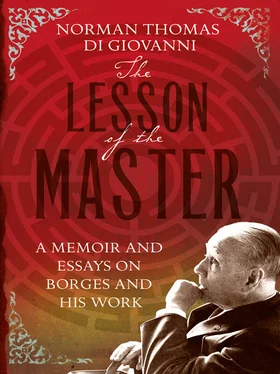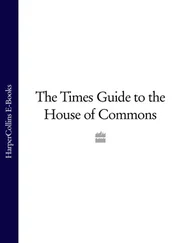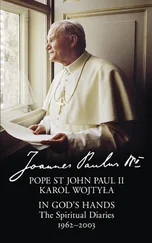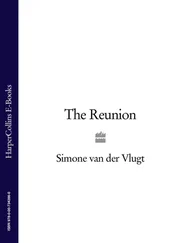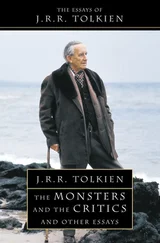Meanwhile, I sent the first chapter of the autobiography to Henderson at the New Yorker, asking whether he thought they might be able to use it. He replied at once to say that if the rest were as good, yes. The entire week of 15 June is blank in my diary with only an explanatory scribble, ‘no work on auto. essay this week. Spent most of time preparing the divorce.’ The next month started out with blank pages as well.
D-Day was 7 July 1970. Only it was not an invasion but a getaway. That chill, grey winter’s morning – as part of our elaborately hatched plan – I lay in wait for Borges in the doorway of the National Library, and the moment he arrived I leapt into his taxi and off we sped for the intown airport. Borges, a trembling leaf and utterly exhausted after a sleepless night, confessed that his greatest fear had been that he might blurt the whole thing out to Elsa at any moment. Hugo Santiago, the film-maker, who was in on the plot, and my wife were there at the flight counter with a pair of single tickets to Córdoba for Borges and me, where the lawyer had booked us into a hotel only we two knew the name of. Like good conspirators, we allowed no one knowledge of the whole plan. That way, no lies needed to be told, nor could anything be given away. Doña Leonor, Borges’s ninety-four-year-old mother, who was punctilious in her rectitude, feared that Elsa would be quick to ring her for information, and while Leonor wanted to be able to say in truth that she did not know her son’s whereabouts, still she was anxious to be able to reach him if necessary. That was easy. I gave her a telephone number on a slip of paper in a sealed envelope and had her watch me secrete it in a drawer of her desk.
Bad weather delayed our flight, and a jittery Borges thought the jig was up. Santiago and I did our best to put him at ease, laughing at our own feeble attempts at gallows humour, but it was nervous laughter and both of us, I know, were quaking in our boots. Eventually, by twelve o’clock, our plane took off.
We holed up for a whole week, first in Córdoba, then in Coronel Pringles, where, after a daylong drive across the pampa, we barely arrived in time for a lecture Borges was to deliver on the subject of the Indian raids and the conquest of the desert – meaning the conquest of the Indians – of the previous century. Borges put on a brave face, stubbornly insisting that he was fit to travel these enormous distances, fit to engage in public speaking, but he was on the edge of nervous collapse. The next day his spirits picked up when he could show me the town of Coronel Suárez, some seventy-five kilometres away, named after his great-grandfather. We drove there in caravan with the mayor and other town officials of Pringles, to be met by their counterparts in Suárez, where a splendid midday banquet was laid on for us all. I sat next to the priest, a jolly fellow who, when I told him my religion was nada, nothing, made a rather good pun, retorting, ‘Nada, nada y nunca se ahoga’ – swim, swim, and never drown. Borges, who hated puns, pronounced this one first-rate.
Eventually, we got to our destination, Pardo, where we stayed in the old dusky-rose house belonging to Bioy Casares, the one that figures in the opening of Borges’s story ‘The South’. Eventually, we got back to the autobiography too. In fact, by sheer coincidence, it was at Pardo that we reached the point in his life when Borges met Bioy, and we wrote those pages of the story before crackling eucalyptus fires laid on by Bioy’s steward. Eventually, we finished the autobiography, not there, nor back in Buenos Aires even, but in the town of Tres Arroyos, again in the far south of the province. Borges had been invited to lecture on the poet Almafuerte. It was 29 July. In a room in the Parque Hotel, Borges lay stretched out on a single bed while I sat on the edge of another, a cleared bedside table between us as my desk, taking down the last words of his dictation. They were not the fine words that come at the end of the finished essay but emendations and additions to the conclusion of the previous paragraph, in which he speaks of longing to write, under a pen name, a merciless tirade against himself. ‘Ah, the unvarnished truths I harbour!’
The next week, back home, galley proofs of The Aleph and Other Stories arrived; the week after, the New Yorker’s cable saying they were taking the autobiography as a Profile. That same day, 12 August, Borges finished the final draft of his long story ‘El Congreso’, and together we finished the last two commentaries and our foreword to the book for Macrae. In my diary, there is no mention that the next day I posted the material off, but I must have. Instead, my mind was already on something else. The abstemious entry reads only, ‘Errands for Brazil trip.’ For it was just then, when he needed it, that the highly remunerative Matarazzo prize had been awarded to Borges for his life’s work.
‘Here in Argentina,’ Borges had told me on my very first morning in Buenos Aires, ‘friendship is perhaps more important than love.’
II
Borges and His Interpreters
For the most part, explanations of Jorge Luis Borges’s work have been more complicated than Borges’s work itself. Employing unpronounceable terminology, sometimes even inventing it, these interpretations usually map out elaborate systems whose outline the author, the most haphazard of men, never had the patience or curiosity to follow. Borges had no system, no programme, no grand scheme, and he tells us so twice over in one of his forewords. ‘I lay no claim to any particular theories’, he wrote in In Praise of Darkness, and added, ‘I am skeptical of aesthetic theories. They are generally little more than useless abstractions….’ He had what he called dreams – by which he meant daydreams. Whim, caprice, and daydreams guided him, even in his private life. So whimsical was he in his daily conduct, in fact, that once asked why he had signed a contract to provide an encyclopaedia article he had no intention of writing, he replied that he was being badgered, that it was a way of changing the subject, and that – as he was leaving for the Argentine the next day – hopefully the publisher would forget all about it.
Such erraticism, hand in hand with a chronic lack of confidence, even spilled over into the way Borges presented his work to the public. Convinced that each published volume would be his last, he never quite knew what to do with a new story or poem. A glimpse into the tangled web of his bibliography in the twenty or so years from the mid-1930s to the mid-1950s tells the story. Fresh work would find its way unannounced not only into a new edition of an old book but also – still secretly – into one or another impression (or, more accurately, ‘reimpression’) of that edition. (A case in point is Borges’s story ‘La intrusa’, tucked silently into the back of the 1957 edition of El Aleph in its so-called sixth impression, which is dated April 1966.) 1Had Borges been systematic, his fiction – in terms of separate volumes – would have been richer by at least another title or two.
Writers on Borges have taken him far more seriously than he took himself. Laughter loomed large in Borges’s world, and to him literature was joy. Whenever these things are pointed out to his commentators, inevitably they go all solemn and fall back on the unanswerable. Invoking the subconscious, they claim that Borges was never fully aware of what he had created. Worse still, so po-faced are these exegetes that to a man (or woman) they miss the point that Jorge Luis Borges was one of the great comic writers of our time.
So let’s be guided straight into the vaunted labyrinth of Jorge Luis Borges, unencumbered by the thicket of critical apparatus that has grown up around his work. There is a line in Byron’s Don Juan – ‘I only say, suppose this supposition’ – that comes to our aid. If we place these words at the head of almost any Borges story, the Argentine master is made instantly accessible, more so than by any of the vast unreadable library of books, articles, reviews, and doctoral theses that for years now his work has spawned.
Читать дальше
